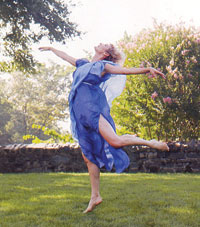Deeply Moved By Dance

Cynthia Word, MFA ’91, is founder of Word Dance Theater, a nonprofit that provides venues for community members to find healing and meaning through dance.
In a city full of legislators, lawyers, and high-powered leaders, Washingtonian Cynthia Word, MFA ’91, uses the arts to create community change.
The choreographer, educator, and performer is founder of Word Dance Theater, a nonprofit devoted to exposing community members to the beauty of dance through educational outreach and performances in venues throughout the Washington region. The organization, which started in 2001, offers after-school dance programs for children and teens, creative exercise and movement workshops for senior citizens, and concerts with post-performance discussions between the dancers and visitors. The goal of these projects, Word says, is to help community members find healing and meaning through movement.
In dance, there’s a “body-mind-spirit connection that happens,” Word says. “That’s really why it’s so empowering.”
Word taps into that excitement to connect with students from all walks of life. In addition to being artistic director at the dance company, Word serves as dance education consultant with the Kennedy Center Department of Education, where she works with elementary school teachers in Washington and around the nation to integrate dance into classroom curriculum. Word is also a guest choreographer at the National Cathedral School. In 2005, she earned the ABC News Honorable Tribute to Working Women award for her commitment to the community. Word Dance Theater maintains a fund to provide free or minimally priced tickets to anyone who can’t afford to see a show. The theater also offers scholarship opportunities for adults and youths for all classes and workshops.
The experience of working with underserved youth makes her “even more aware of how important this work is,” Word says, “not just my work, but of being an artist in this society, in this culture.” She believes that in troubled times, as important as it is to care for the physical body, it is also necessary to nourish the spirit and soul through the arts.
Cultivating life as an artist in the midst of a large, politically-driven city can be a challenge, Word says. “It is difficult because you’re not in the mainstream,” she says, “and so that manifests in a lot of ways, in terms of being able to make a living, and in finding kindred spirits.” Word found one kindred spirit early on, at GW.
After receiving a full scholarship to the University, she met professor Maida Withers in the Department of Theatre and Dance and the two clicked. “Maida’s presence in my life has shaped my artistic path significantly,” she says. Word re-joined GW’s Dance and Theater Department this spring for a four-month residency, where she worked with GW dance students on three dances performed in the Spring Dance concert in mid-April.
Recently, Word’s path has led to fascination with the life and works of Isadora Duncan, a turn-of-the-century artist and revolutionary who is considered the mother of modern dance. Word produced a performance based on Duncan’s life and works because the two share a philosophy that “dance should move the audience emotionally.” Word says that often, the focus of dance is on the spectacle, on the athleticism, rather than on the emotional connection that can form between the audience and the dancer.
“Ideally the audience isn’t just watching and thinking ‘Oh, I could never do that. I’ll just watch them; I’ll just sit back,’” Word explains. “When that happens, some part of you closes off and becomes an observer. But Isadora Duncan really wanted the audience to participate emotionally with the dance.”
Last summer at the Capitol Fringe Festival, the Word Dance Theater performed a show called Revolutionary! Isadora Duncan, which merged music and dance with scenes of an actress working from a script based on Duncan’s own writings.
Most recently, Word Dance Theater participated in the Dance is the Answer in late April, and Word will tour Greece as a guest artist with The Isadora Duncan International Institute in May. Revolutionary! will be performed at the Doris Humphrey Institute at Goucher College this June, and Word Dance Theater will be returning to the Capitol Fringe Festival in July for a handful of shows.
Through all of her performances, Word remembers Duncan’s lessons and takes care to honor the naturalness and beauty of human movement, especially now, she says, when we put so much faith in technology.
“Duncan was all about understanding that the dancer needs to be in touch with nature, both their own and nature itself, drawing from those timeless rhythms and those beautiful patterns,” Word says. “Her message is still very real and very fresh, and very needed right now.”
—Nikki Baldauf
